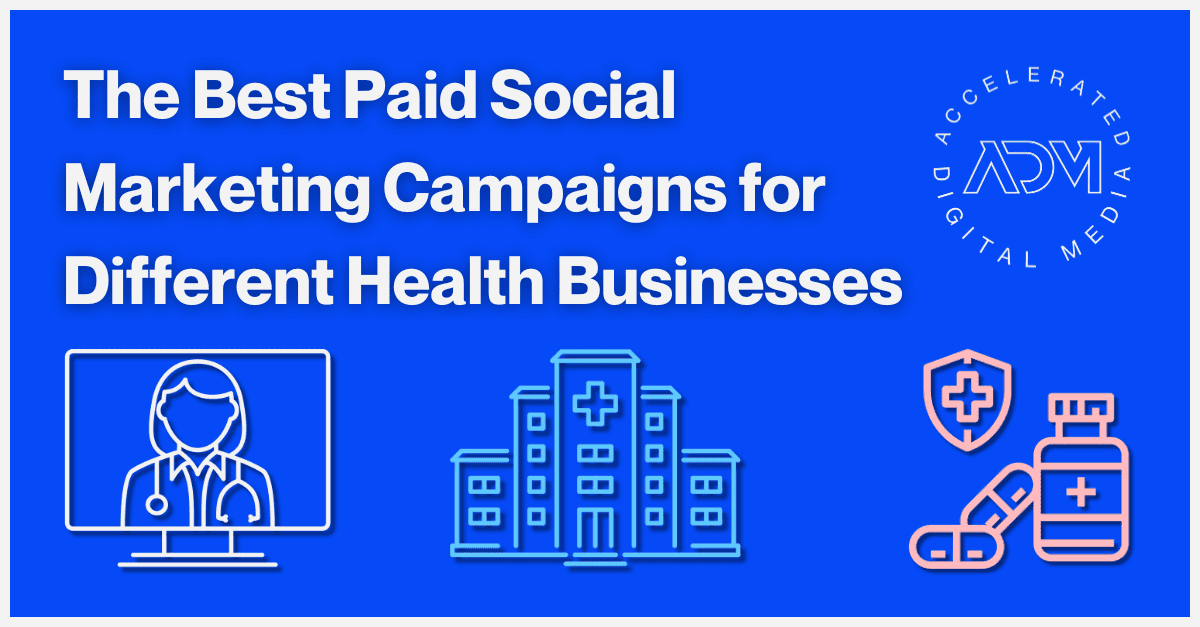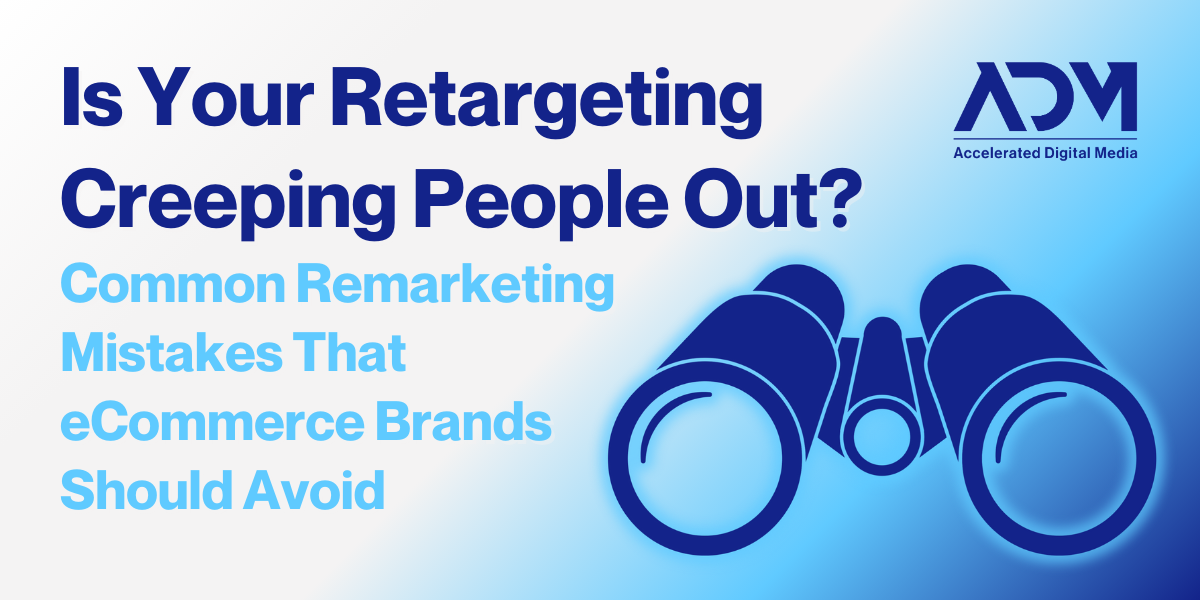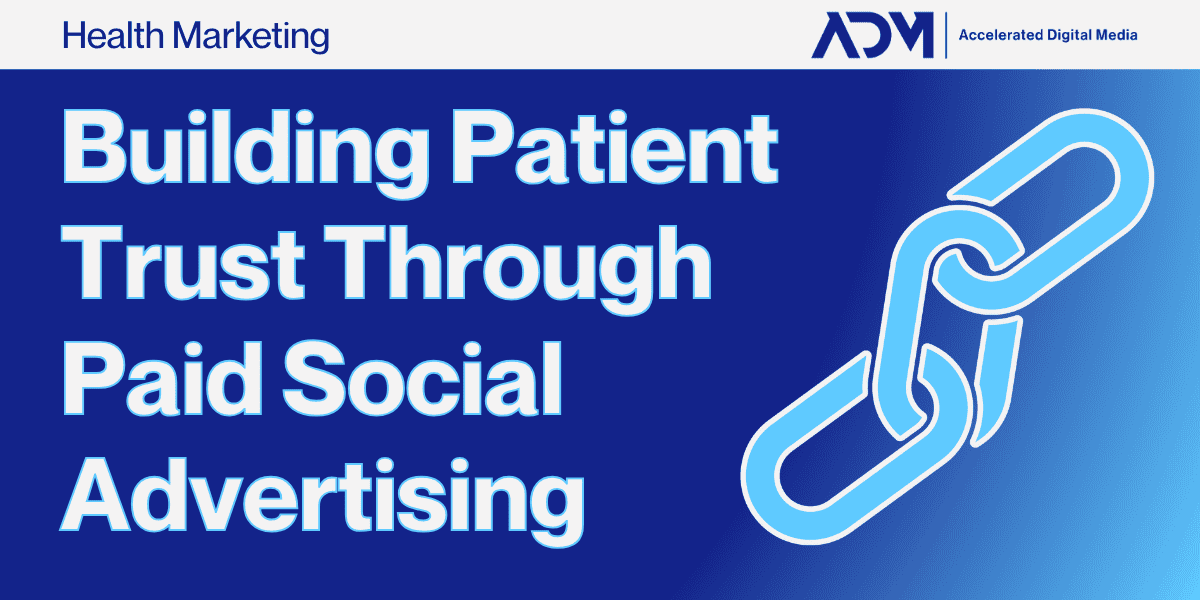There are a lot of misconceptions about how paid social advertising can be used in healthcare. Because of the limitations on how health brands can advertise, some in this space might believe that their social efforts need to be limited to simple awareness-raising campaigns. That isn’t the case at all.
Social advertising is able to support the entire patient acquisition funnel, though there are some common-sense limitations based on the laws and platform policies that regulate medical advertising. In this blog, we’ll lay out our health marketing agency‘s campaign recommendations for different healthcare company types based on marketing function and business need.
General Paid Social Media Campaigns for Health Marketing
Given the amount of variety in how different healthcare businesses operate, ADM has specific recommendations based on those differences that we will discuss in the coming sections. But there are some general campaign types that will apply throughout the space:
- For awareness, Video View campaigns are effective because they excel at driving brand recall. Meta and TikTok are the social top channels for running these types of campaigns because of their focus on video content.
- In the consideration phase, Pinterest and Reddit can be strong additions because they are platforms users often turn to for pre-purchase research.
- The right channels for bottom-of-funnel objectives like sales and lead gen will usually be business-specific, but Meta excels at driving direct-to-consumer (D2C) sales, while LinkedIn shines for businesses with more complex customer journeys, higher-priced products, or B2B.
Key Social Media Campaigns for Telehealth and Teletherapy Brands
In addition to the aforementioned policy limitations, social marketing can also be a challenge for health brands that offer a service rather than physical products, like medical devices or prescription medications. Fueling conversions for telehealth and teletherapy services can be tricky, but there are some tried-and-true campaign types ADM relies on to support these businesses and their goals:
Lead Gen
For health brands looking to convert patients into long-term, recurring customers, lead-gen campaigns are a strong play. Patient journeys often require a high degree of nurturing before they lead to conversions. Paid social can help with this journey by directing users to pages where they can express their interest in the services by providing contact information (like their email address or phone number) and consent for communications. With the proper consent, that information can be utilized in other channels, like email outreach or SMS campaigns, for nurture and eventual conversion.
The same principles can apply to B2B healthcare businesses whose conversions may require contracts. By acquiring decision-maker contact information via paid social, sales representatives can then follow up and move those leads down the funnel via outreach.
App Install
Many digital health and telehealth companies operate via mobile applications, and Meta and other paid social platforms offer campaign types specifically optimized to encourage app installations. App installations can be a key conversion for many brands because they bring the user closer to signing up for the service itself. By leading potential patients directly to the health platform, they are more likely to convert in moments of need due to the convenience of an already installed app at their fingertips.
Paid Social Campaigns for Hospitals and Health Clinics
There are also certain campaign types that are particularly useful for brick-and-mortar healthcare centers, like hospitals and clinics seeking to increase appointment bookings or visits for their in-person care.
Upper Funnel Awareness Campaigns
Brick-and-mortar healthcare providers that specialize in emergency or urgent care need to make sure they’re top-of-mind for potential patients when a need for care arises. That means upper-funnel objectives, like video views and traffic, are essential mechanisms. These providers should focus on driving repeat impressions and encouraging website visits, and locally targeted social media awareness campaigns are the best way to do that.
Call Campaigns
Hospitals and health clinics can also benefit from click-to-call campaigns, which give potential patients an easy way to reach out directly to a health center and schedule an appointment. This type of campaign is likely best served for traditional preventative care providers or specialists as opposed to urgent care centers—because people are unlikely to be scrolling Facebook in a moment of immediate medical need. But a reminder that quality care is available, paired with an easy way to set up an office visit, might be just the nudge someone with a lingering health concern needs in order to convert.
Marketing Considerations for Direct-to-Consumer Health Brands
For healthcare companies that do offer specific D2C products, like medications or medical devices, some of the aforementioned campaign types can still be effective. Lead gen campaigns in particular are valuable because something as significant as purchasing a medication can require a longer customer journey with more nurture points.
Conversion campaigns are still the gold standard for any business (not just healthcare) that is selling a product. We can, and do, run conversion campaigns for these businesses, and many of the strategic pillars remain the same as for traditional eCommerce marketing. For example, creative will always be the most impactful piece of your paid social media conversion campaigns. At ADM, we still focus on testing various creative formats and messaging to uncover which approaches resonate best with potential customers.
One thing to note here is that “quick” conversions are less common for health products—given the amount of serious consideration patients must undergo when making medical decisions. This is when we might recommend using lead gen campaigns in order to build up the company’s email or SMS list, where potential customers can be nurtured and converted.
That said, there are some instances where health marketing on paid social does mimic the trends found in standard eCommerce marketing. For instance, you may not think about Black Friday/Cyber Monday sales as a possible conversion driver for health brands—but with the right product and angle, we have actually seen it be quite effective. We helped one brand set up a discount campaign for medical testing kits that delivered a return on ad spend (ROAS) almost 4x higher than their business-as-usual marketing. While “sale” messaging may seem limited to general eCommerce verticals like apparel and beauty products, it can still help promote urgency and increase conversion rates for D2C health brands.
What Won’t Work for Health Companies on Paid Social
While many of the same campaign-building principles of non-healthcare marketing apply in this field, there are key marketing functions that are less viable for health brands.
Retargeting isn’t completely out of the question for healthcare businesses, but it is a trickier application. First-party patient data cannot be used in health marketing without creating potential HIPAA violations. However, public information like the followers of a brand’s Facebook or Instagram page and who is engaging with their posts, can be used for audience creation. ADM leverages these public lists to retarget page followers that have not yet converted as well as to create lookalike audiences of those similar to their followers. These are a few of the methods ADM deploys for healthcare businesses to remain compliant and effective on social channels.
When it comes to driving D2C sales, many social platforms require businesses to obtain specific certifications in order to advertise. That includes LegitScript, a third-party certification body that vets and verifies medication distributors before advertising on major digital platforms.
In addition, catalog or Dynamic Product Ads (DPAs) cannot be used to sell medical products—so those campaign types are out of the question for D2C health businesses.
Even when appropriately certified and maintaining compliance with audiences, healthcare businesses are usually subject to higher levels of scrutiny in the ad review process. Across all social platforms, all ads must pass through an automated review process before they are allowed to serve.
While this approval process is vertical agnostic, healthcare products are subject to a longer list of guidelines they must follow within their creative. For example: Most social platforms forbid the use of “before and after” ad creative, and really most messaging that implies or guarantees dramatic results from medical intervention. Health businesses should consider these guidelines in advance when developing creative, and should be prepared to quickly address any automated ad rejections that come through.
Building the Right Social Media Plan for Your Health Brand
Ultimately, the blend of campaigns that your business deploys will depend mightily on the types of health services you are offering and the growth goals you set for them. Advertisers in this space face a web of platform and legal restrictions, and combining those with the specific nuances of the patient journey makes for a complex marketing environment. If you’re looking for a health marketing partner to help you build a strong, compliant paid social media strategy, consider reaching out to the ADM team for a consultation or digital marketing audit below:




